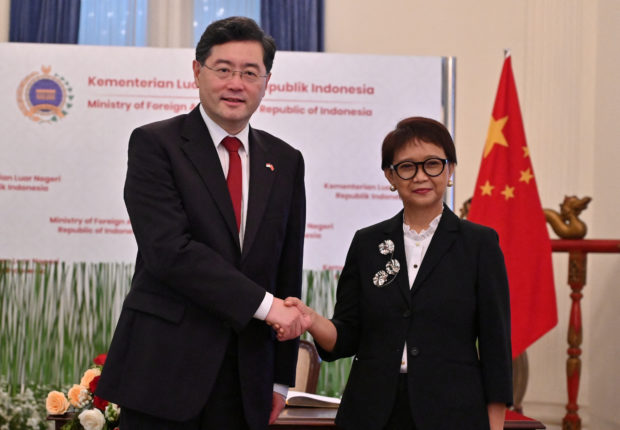China, Asean to intensify negotiations on South China Sea code

Chinese Foreign Minister Qin Gang shake hands with Indonesian Foreign Minister Retno Marsudi during the photo session in Jakarta, Indonesia, February 22, 2023. Adek Berry/Pool via REUTERS
JAKARTA — Negotiations on a code of conduct (COC) for the South China Sea will be intensified this year, Indonesian and Chinese officials said on Wednesday, as the region frets over China’s assertiveness in the strategic waterway.
Indonesia’s Foreign Minister Retno Marsudi met with Chinese counterpart Qin Gang in Jakarta, ahead of a round of negotiations on the code starting in March.
“Indonesia and Asean would like to produce an effective, substantive and actionable (code of conduct),” Retno said, referring to the Association of Southeast Asian Nations, a regional bloc that Indonesia chairs this year.
Qin added that China and Asean will jointly safeguard peace and stability in the strategic trade corridor, through which about $3.4 trillion of goods pass each year.
China would work with Asean countries to accelerate consultations on the code, he said.
Article continues after this advertisementBeijing claims much of the South China Sea and has built islands from which it is capable of deploying advanced weaponry. The Philippines, Vietnam, Malaysia, Taiwan, and Brunei also have some overlapping claims.
Article continues after this advertisementChina and Asean countries agreed in 2002 to work towards creating a code of conduct and it was 15 years before moves were underway to create a framework for negotiations.
Some experts have accused China of intentionally holding up a process to create a binding set of rules, noting its use of grey-zone tactics and strategic ambiguity to press its territorial claims. China says it is committed to seeing the process through.
The code would advance a 2002 commitment by all parties to ensure freedom of navigation and overflight and “(refrain) from action of inhabiting on the presently uninhabited islands, reefs, shoals, cays, and other features”.
The latest talks would take place against a backdrop of increased diplomatic protests against China from the Philippines, which has increased overtures to Western powers like the United States and Australia to counter what it calls China’s “aggressiveness”.
Qin on Wednesday said Southeast Asian nations “should not be forced to take sides”.
“New cold war and competitiveness of great powers shouldn’t appear in the Asia-Pacific region. We believe that Indonesia and Asean will make their judgment and choice independently and autonomously in the fundamental interest of the stability, development and prosperity of the region,” he said.
They also discussed the crisis in military-ruled Myanmar, where Asean has struggled to get the generals to implement an agreed ‘five-point consensus’ for peace after the 2021 coup.
“As Asean chair, Indonesia will embark on engagements with all stakeholders in Myanmar, with the one goal of opening up a possibility of an inclusive national dialogue,” Retno said, adding Indonesia appreciates China’s support for the process.
RELATED STORIES